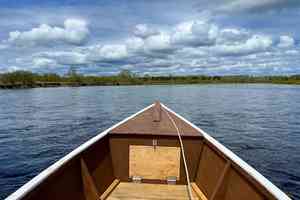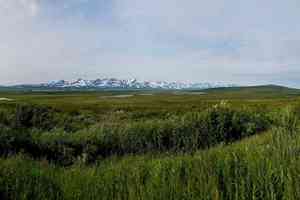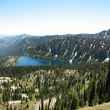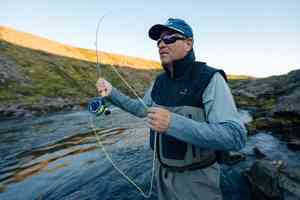Years ago, when I was working to protect public lands in the West from any number of extractive industrial activities, I was fond of telling the generally conservative hunters and anglers that I came into contact with on a daily basis, “You don’t have to be a left-wing radical to engage thoughtfully in conservation. You just have to be pragmatic and understand what it is you’re fighting for.”
In time, people with much bigger brains than mine channeled their passion for hunting and fishing away from the emotional red-meat issues that were pervasive in sporting circles and toward more progressive causes like keeping Idaho’s untrammeled backcountry intact. In 2008, the blood-red state of Idaho was the first in the nation to produce its own roadiess area protection rule, a collaborative plan that many would argue is more restrictive — at least in terms of future public lands development — than the Clinton-era Roadless Rule that raised such a ruckus among the extractive industry crowd two decades ago.
How did such a thoughtful document that did so many good things for Idaho’s stellar natural resources get done in a state so acutely conservative? Everyone who came to the table was able to get past the notion that environmentalism was a “liberal” ideal. Hunters and anglers played an outsized role in the effort. Once deemed the “missing link” in western conservation battles that stretched back decades, sportsmen and women showed up, and they did so because it was very easy to demonstrate the importance of intact landscapes to the fish and game they relied on to be successful in the field.
Unfortunately, these public lands battles are still being waged, and the sporting community is still trying to straddle an imaginary ideological fence, all while the real idealogues are pushing an agenda and shelling out millions to get it done. Thankfully, and this may surprise some, the U.S. Supreme Court still has some sway and, when its justices choose to honor it, precedence matters. Earlier this month, the high court rejected a lawsuit brought by Utah’s “states rights” wing seeking to wrest control of 18.5 million acres of public lands from federal oversight and deliver that land to the state to be managed for profit. In other words, the state would be in charge of mineral leasing, grazing, development and even disposal through sale (privatization).
This war has been waged in Utah for years — it’s part of an overarching right-wing platform pushed by western conservatives and largely funded by extractive industry via virtually unlimited access to elected officials thanks to bottomless political war chests. And, with a conservative-led Congress already dog-whistling its intent to give industry carte-blanche access to federal lands for extractive development, even a Supreme Court lawsuit rejection won’t stall the privatization movement.
Throw in a new administration that brazenly told industry and oligarchs who invested at least $1 billion in the U.S. economy that they’d be in line for easier access to development rights on federal public lands, and it’s easy to see where this is headed. It’s even easier to see what’s going to really decide the future of our shared national treasure if public lands advocates can’t overcome the larger political distractions and really lean in like we did all those years ago.
In other words, it’s time to dispense with the emotional rhetoric about things like “wokeness” and put the already-decided (and cemented in the Bill of Rights) Second Amendment issue on the backburner. Years ago, I was fond of asking my fellow hunting friends and fervent gun rights activists, “What good is the Second Amendment going to do for you if you lose the places where you go to hunt deer and elk to the drill bit or the excavator?”
The question stands today. Public lands advocates — and that includes you, hunters and anglers — have limited options when it comes to countering the seemingly endless stream of political funding that bought-and-paid-for politicians are using to put forth a public lands privatization agenda. It’s going to require relentless boots-on-the-ground organization and the willingness to look past the political sleight-of-hand maneuvers and a change of heart when the next election day rolls around.
Want to know what you’re up against? Here’s the state of play, just in Utah and just involving the oil and gas industry, when it comes to who’s funding the effort to privatize your public lands.
- U.S. Sen. Mike Lee has long been an ally of the privatization movement, and, in just the last four election cycles (2018, 2020, 2022 and 2024), he’s accepted nearly $1.2 million in contributions from the oil and gas industry.
- U.S. Sen. John Curtis, who first came to Congress after winning a 2017 special election to replace Rep. Jason Chaffetz, was just elected in 2024 to replace outgoing Sen. Mitt Romney in the Senate. In his seven-plus years in Washington, Curtis has accepted more than $400,000 from the oil and gas industry.
- Utah Gov. Spencer Cox, who’s been a statewide elected official since 2012, and was elected governor in 2020, has accepted nearly a quarter of a million dollars in campaign contributions from the oil and gas industry since 2019.
- U.S. Rep. Blake Moore (1st District) was elected to Congress in 2020 has taken in nearly $100,000 from the oil and gas industry in three election cycles.
- U.S. Rep. Celeste Maloy (2nd District), who was elected to the House in a 2023 special election, accepted $71,575 in campaign funds from the oil and gas industry since joining Congress.
- U.S. Rep. Burgess Owens (4th District), was elected to the House in 2020, and has accepted more than $77,000 in campaign funding from the oil and gas industry.
Those numbers might not seem like much, but that’s only Utah. Nationwide, in just the 2024 election cycle, the oil and gas industry invested $240 million in Congressional politicians and nearly $445 million when the Trump campaign is included. And that’s what it is — an investment. With virtually no caps on how much companies can spend thanks to the 2010 Citizens United Supreme Court ruling, the industry can simply buy politicians. It’s perfectly legal, and it’s a drop in the bucket. In 2023 (latest year for available data), the oil and industry racked up $2.4 trillion in income. In other words, for .01 percent of its annual profits, the oil and gas industry can buy enough Congressional political favor to continue working to rob every single American of our one, true birthright — our shared public lands.
By funding efforts to sue for state ownership of federal public lands, or by directing legislators to help industry achieve access to drilling leases on the Alaskan tundra or in the middle of our big-game migration corridors, the headwaters of our trout and salmon rivers and the very land we use for recreation and rejuvenation, the industry is directing policy.
The only way to counter this kind of uber-funded and highly strategic effort is to be overt about the need to keep public lands in public hands. And, for the newbies to this effort, consider this: the federal government doesn’t own public lands. You own public lands. The U.S. Forest Service, the Fish & Wildlife Service, the Bureau of Land Management and the Bureau of Reclamation? These are your property managers.
Unfortunately, they are all subject to Congressional oversight, and in a Congress guided by idealogues who aren’t answerable to an electorate as much as they are to their industry benefactors, the next couple of years (at least) are going to require lots of loud voices, public questioning of political priorities and some real work. Most importantly, pragmatism should outweigh some of the emotional ear candy being doled out by owned politicians who continue to scare the hell out of us with spittle-riddled rants about pronouns and who’s coming after your AR.
There is one question I learned to ask myself while working in the conservation trenches over the years: If something doesn’t change your life, is it worth the energy to engage? Does the emo-driven pablum about someone’s chosen identity really matter? Not to me. Does losing access to lands that I and 330 million other Americans own, free and clear, matter to me?
You bet your ass it does. I hope it matters to you, too.

































Comments